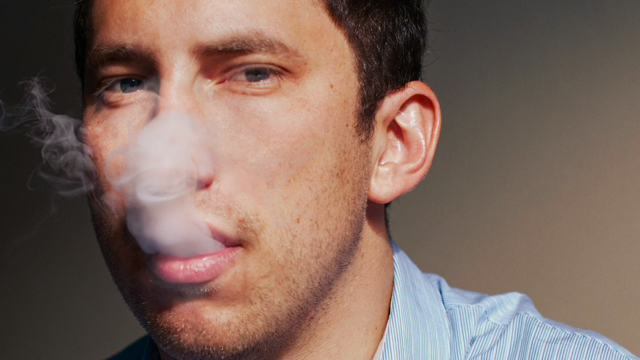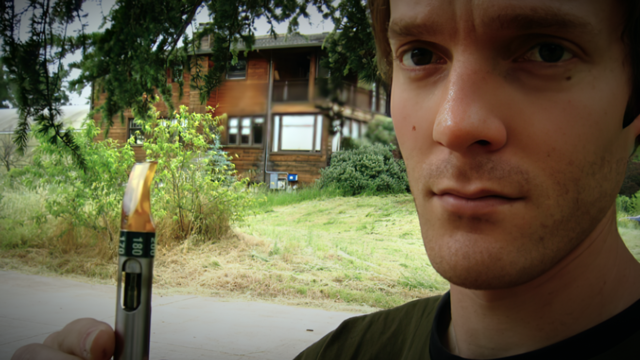I was prepared to hate-watch the new Netflix limited docuseries, Big Vape: The Rise and Fall of Juul, directed by R.J. Cutler. The name alone pissed me off because of its implied conflation of Juul, which is not a tobacco company, with “Big Tobacco.” The trailer is a feverish montage of talking heads and voiceover accusing the company of being “wildly irresponsible,” photos of hospitalized patients with bloody chest tubes, and a clip of James Monsees, one of Juul’s founders, being called “a marketer of poison to young people” at a congressional hearing.
So I was happily shocked when I was proven wrong. It was amazing when the first episode, which premieres on Netflix on October 11, showed the journey of how Juul was created and the brilliance of the vape design was celebrated, not demonized.
In each of the four episodes, people unapologetically confront those who told lies about vaping, including the infamous junk scientist Stanton Glantz. For tobacco harm reductionists who lived through the Juul panic, the docuseries is cause for cheer. The director and editors seem to understand the life-saving potential of switching from smoking to vaping, the pressures of bringing a product to market and the problems with the backlash against Juul. They mostly get the balance right.
Innovation with an emphasis on speed, disrupting old technologies instead of playing it safe, was long overdue to make smoking obsolete.
The docuseries is based on TIME journalist Jaime Ducharme’s book, Big Vape: The Incendiary Rise of Juul, which is well worth a read. It features a huge cast of characters on all sides of the Juul controversy: Stanford tobacco historian Robert Proctor; Ralph Eschenbach, an early investor; Meredith Berkman of Parents Against Vaping E-cigarettes (PAVE); NYU tobacco expert Cheryl Healton, and advocate Greg Conley, president of the American Vaping Association. Adults and teens who vape are also interviewed.
David Pierce, a former tech reporter for Wired, is one of the main narrators along with Allen Gladstone, a former talent recruiter for Juul, and Ducharme. Juul founders James Monsees and Adam Bowen declined to be interviewed.
The famous Silicon Valley motto “Move fast and break things” is referenced several times, usually in a negative way. Glantz calls it “stupid.” But when it comes to the decades-long, intractable public health crisis of over 28 million Americans smoking and almost half a million dying each year, moving fast and breaking things is required. Innovation with an emphasis on speed, disrupting old technologies instead of playing it safe, was long overdue to make smoking obsolete. A graph in the docuseries shows how people switching to Juul decreased smoking. Tobacco companies took note of the dip in cigarette sales and got in on the vape market.
Some of the most satisfying and enjoyable scenes are when former Juul employees confront the lies and myths that come out of the mouths of the haters. Former marketing manager Erica Halverson takes down the rich moms from Manhattan who founded PAVE. Berkman, who comes off as hyperbolic and entitled, wants to punish Juul because her son used to use Juul. Halverson retorts, “Parents got upset because they forgot they had to parent their kids and Juul isn’t responsible for that.”
“I literally had people tell me there is no way adults like mango as much as kids do … That’s a bunch of bullshit to me.”
PAVE constantly promoted the myth that flavors were used to “addict” teens. Halverson’s reply is refreshing in its bluntness: “I literally had people tell me there is no way adults like mango as much as kids do … That’s a bunch of bullshit to me. Bullshit. Adults and kids like mango!”
Ash Casselman, former director of product delivery, is equally blunt when she calls the ban on vape sales enacted in San Francisco in 2019 “a fucking travesty.”
And importantly, a documentary that will be watched by millions calls bullshit on the media-driven “EVALI” panic that wrongly linked over 60 deaths to nicotine vaping, including, by implication, Juul. Several commentators clearly and convincingly explain Juul had nothing to do with the deadly lung injuries, which were caused by unregulated THC cartridges containing vitamin E acetate.
Much time is spent deconstructing the Juul launch campaign called “Vaporized.” This is important because the PAVE and the Bloomberg-funded Campaign for Tobacco-Free Kids seized on it to assert Juul was taking a page from the Big Tobacco playbook to “hook” teens. Slide shows that placed photos of the Vaporized campaign next to photos of tobacco company advertisements were suddenly everywhere, and used by the media as proof that Juul was guilty.
The goal of anti-vaping groups was always to use the tobacco industry’s past to destroy the vaping industry’s future. According to the docuseries, the two men hired to conceive the campaign knew nothing about the past advertising practices of cigarette manufacturers. They created and launched the campaign in one month! “Vaporized” lasted less than six months.
Still, Monsees and Bowen admitted that the campaign was a mistake. Juul moved quickly to undo the damage but to no avail. A well-funded and vicious backlash unleashed by tobacco control groups and the Food and Drug Administration (FDA) battered its reputation and destabilized the company financially. Eventually, this situation led to the tobacco giant Altria buying a minority stake in Juul (which it no longer holds).

James Monsees

Adam Bowen
The real blame for this social media campaign blunder, the docuseries suggests, lies with the capitalist “angel” investors who put enormous pressure on Juul to ramp up sales, to “grow, grow, grow” in order to increase profit margins.
The docuseries has some critical omissions. Micheal Bloomberg is never mentioned as a major funder of anti-vaping organizations. Neither is the fact that the numbers of teens vaping and smoking have dropped dramatically.
It also gets some things wrong: There was never an “epidemic” of teen vaping. And there is no evidence that nicotine damages the human brain.
Monsees and Bowen, who both previously smoked, never gave up in their quest to “reinvent smoking.”
Unfortunately, Mitch Zeller, the former head of the FDA’s Center for Tobacco Products, comes over as a noble defender of “the children” in the series. But the role he played during the vaping panic he helped to ignite was disgraceful, and seemingly based on personal animus toward Juul. Initially he promoted tobacco harm reduction and supported vaping, but the minute the National Youth Tobacco Survey showed an increase in teen vaping was released, he completely abandoned THR, joined the anti-vaping zealots, and worked to destroy Juul.
The documentary could have revealed that Zeller plays both sides. Now he’s an advisor for Qnovia, a start-up founded by a former Altria executive who is developing RespiRx, a prescription-only “nicotine-replacement device” (it’s a vape).
Big Vape methodically takes the audience through the dozens of setbacks and technical challenges Monsees and Bowen faced in creating a revolutionary noncombustible nicotine delivery device. The pair, who both previously smoked, never gave up in their quest to “reinvent smoking.” The world is a much better place for their intelligence, creativity and tenacity in the face of so much hatred and so many lies.
The proof of concept is that millions of people have made a switch likely to save their lives. History will look back on the inventors of Juul with respect and awe, and on their many detractors with shame and disgust. This must-see docuseries is the beginning of that history.
All images courtesy of Netflix
The Influence Foundation, which operates Filter, has received grants from both Juul and Altria. Filter‘s Editorial Independence Policy applies.





Show Comments